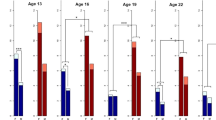Abstract
The purpose of this investigation was to assess gender differences in the expression of different feelings as well as to examine the relationship between each gender's confidence in expressing different feelings and the target person's gender. The subjects, 100 male and 125 female psychology students at a community college, self-rated their confidence in expressing emotions by completing the Efficacy and Consequence Expectations for Social Skills (ECESS). Multivariate analyses and then univariate and post hoc analyses were performed. Findings indicated a significant interaction between subject gender and target person gender for confidence in expressing anger and love/liking/affection. Males reported lower confidence in expressing anger to females than did female subjects, and males were more confident expressing anger to men than to women. Females reported significantly higher confidence in expressing liking/love/affection to males than did male subjects. Female subjects were significantly more confident in expressing fear and sadness than male subjects regardless of the target person's gender. However, females did not report significantly more confidence in expressing loneliness than males with either target gender.
Similar content being viewed by others
References
Balswick, J. O. Male inexpressiveness: Psychological and social aspects. In K. Soloman & M. Levy (Eds.), Men in transition: Theory and therapy. New York: Plenum, 1982.
Balswick, J. O. The inexpressive male. Lexington, MA: Lexington Books, 1988.
Bandura, A. Self-efficacy mechanism in human agency. American Psychologist, 1982, 37(2), 122–147.
Block, J. H. Issues, problems, and pitfalls in assessing sex differences: A critical review of The psychology of sex differences. Merrill-Palmer Quarterly, 1976, 22(4), 283–308.
Chiauzzi, E., Heimberg, R. G., & Doty, D. Task analysis of assertive behavior revisited: The role of situational variables with female college students. Behavioral Counseling Quarterly, 1982, 2(1), 42–50.
Collier, H. V. Counseling women: A guide of therapists. New York: The Free Press, 1980.
Dosser, D. A. Male expressiveness: behavioral intervention. In K. Soloman & M. Levy (Eds.), Men in transition: Theory and therapy. New York: Plenum, 1982.
Galassi, J. P., & Galassi, M. D. A comparison of the factor structure of an assertion scale across sex and population. Behavior Therapy, 1979, 10, 117–128.
Gilligan, C. In a different voice. Cambridge, MA: Harvard University, 1982.
Goldberg, H. The hazards of being male: Surviving the myth of masculine privilege. Plainview, NY: Nash, 1976.
Hackett, G., Zander, T., Esposito, D., Lucas, E., & Smith. Gender differences in personal reactions to and perceptions of the appropriateness of assertive and aggressive behavior. Paper presented at the annual meeting of the American Psychological Association, August 1985.
Heppner, P. P. Counseling men in groups. Personnel and Guidance Journal, 1981, 60, 249–252.
Highlen, P. S., & Gillis, S. F. Effects of situational factors, sex, and attitude on affective self-disclosure and anxiety. Journal of Counseling Psychology, 1978, 25(4), 270–276.
Highlen, P. S., & Johnston, B. Effects of situational variables on affective self disclosure with acquaintances. Journal of Counseling Psychology, 1979, 26(3), 255–258.
Hollandsworth, J. G., & Wall, K. E. Sex differences in assertive behavior: An empirical investigation. Journal of Counseling Psychology, 1977, 24, 217–222.
Kelly, J. A., O'Brien, G. G., & Hosford, R. Sex roles and social skills considerations for interpersonal adjustment. Psychology Women Quarterly, 1981, 5(5), 758–766.
Lee, C. Self-efficacy and behaviour as predictors of subsequent behaviour in an assertiveness training programme. Behaviour Research and Therapy, 1983, 21(3), 225–232.
Miller, J. B. The development of women's sense of self. Works in progress series. Wellesley, MA: Wellesley College, 1984.
Moe, K. O., & Zeiss, A. M. Measuring self-efficacy expectations for social skills: A methodological inquiry. Cognitive Therapy and Research, 1982, 6(2), 191–205.
O'Neil, J. M. Male sex role conflicts, sexism, and masculinity: Psychological implications for men, women and the counseling psychologist. The Counseling Psychologist, 1981, 9(2), 61–80. (a)
O'Neil, J. M. Petterns of gender role conflict and strain: Sexism and fear of femininity in men's lives. Personnel and Guidance Journal, 1981, 60, 203–210. (b)
O'Neil, J. M. Gender and sex role conflict in men's lives: Implications for psychiatrists, psychologists, and other human service providers. In K. Soloman & M. Levy (Eds.), Men in transition: Theory and therapy. New York: Plenum, 1982.
O'Neil, J. M., Helms, B. J., Gable, R. K., David, L., & Wrightsman, L. S. Gender Role Conflict Scale: College men's fear of femininity. Sex Roles, 1986, 14(5/6), 335–350.
Pitcher, S. W., & Meikle, S. The topography of assertive behavior in positive and negative situations. Behavior Therapy, 1980, 11, 532–547.
Stokes, J., Childs, L., & Fueher, A. Gender and sex roles as predictors of self disclosure. Journal of Counseling Psychology, 1981, 28(6), 510–514.
Surrey, J. The “self in relation”: A theory of women's development. Works in progress series. Wellesley, MA: Wellesley College, 1985.
Author information
Authors and Affiliations
Rights and permissions
About this article
Cite this article
Blier, M.J., Blier-Wilson, L.A. Gender differences in self-rated emotional expressiveness. Sex Roles 21, 287–295 (1989). https://doi.org/10.1007/BF00289908
Issue Date:
DOI: https://doi.org/10.1007/BF00289908




